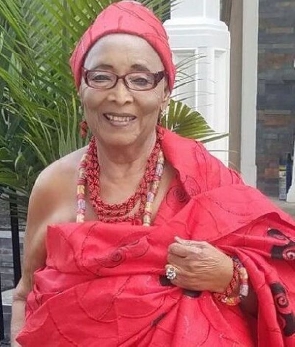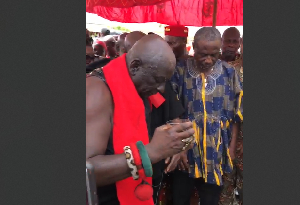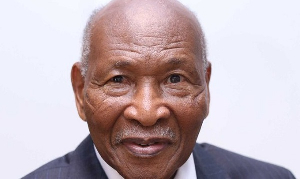Opinions of Thursday, 26 October 2023
Columnist: Darlington Amofa
From the Chief’s palace to the law court: A case of injunction against Ga Manye Funeral
Following the death of Naa Dedei Omaedru III, Paramount Queen mother of the Ga state (Ga Manye), The Ga traditional council announced the burial services to take place on 28th October 2023.
It was further announced that all shops within the Ga metropolis should be closed on Saturday 28th October, 2023 in observance of the funeral and customary rites.
On the 25th of October, 2023, the high court presided over by Justice Patrick Baayeh granted an application which was a motion ex parte for an interim injunction on the funeral of the late Ga Manye.
The order reads as follows:
“IT IS HEREBY ORDERED that the Defendants/Respondents or the Funeral Committee chaired by Nii Otintor II, all members of the committee, their privies, workmen, assigns and all persons working through them are restrained from handling, organizing, touching performing or dealing with the remains of the Late Queen Mother, Naa Dedei Omaedru Il in any manner for a period of ten (10) days”.
It could be gleaned from the ex-parte application for interim injunction that there is a lack of consensus between the family of the late Ga Manye and the Ga traditional council on the date fixed for the burial service of the Late Queen Mother and other issues pertinent to the burial service.
It is however unfortunate that the injunction application was granted *not* taking into consideration the arrangements and preparations which have been put in motion pending the burial of the late Queen Mother.
This article is against the backdrop of a discussion between Lawyer Ayikoi Otoo, a member of the Funeral Planning Committee, and an Accra-based radio station Citi Fm.
The astute legal practitioner obviously created the impression that the funeral service of the late Ga Manye would be held as fixed for Saturday, 28th October 2023, and also stated that some prominent personalities within the political, cultural, and social hemisphere, including the President of the Republic of Ghana would be present during the occasion.
He denied the fact and claimed that he was not privy to the High Court’s order restraining the Ga traditional council from conducting the funeral and reaffirmed that the funeral would take place as agreed on Saturday. He further re-echoed the decision of the Ga traditional council on the ban on all commercial activities within the Accra metropolis.
The current author raises three major issues from the discussion and they are;
WHAT WOULD BE THE LEGAL CONSEQUENCES IF THE FUNERAL IS CONDUCTED AMIDST THE ORDER OF THE COURT?
WOULD IT BE RIGHT BEFORE THE LAW IF THE FUNERAL IS CONDUCTED TAKING INTO CONSIDERATION THE PERSONS INVITED AND PREPARATIONS?
WOULD IGNORANCE ABSOLVE THE GA TRADITIONAL COUNCIL FROM ANY LIABILITY THEREOF IF THEY GO AHEAD TO CONDUCT THE FUNERAL?
Before touching on the issues, let us give an explanation of what Contempt is generally. The power of the court to cite people for Contempt is regarded as the power of the court to protect itself. It is worth stating here that obedience and compliance with the orders of the court is not optional but mandatory.
Contempt of court was succinctly defined by Hayfron-Benjamin in the case of Republic V Nkansah as “Conduct that tends to bring the authority and administration of the court into disrespect or disregard, and or to interfere with or prejudice parties, litigants, or their witnesses is contempt.”
A person may be held for contempt for many reasons which are generally enumerated as follows;
(I) Failure to obey an order of the court,
(ii) Disrupting court proceedings and criticisms against judges which tends to lower their integrity among others.
In Ghana, the Superior court's powers to cite people for contempt are not clearly defined by statute or any enactment. This is to say that the powers of the court in matters of contempt are so imprecise and wide-reaching that they are exercised based on the circumstances of each case.
Notwithstanding that, the Supreme Court in the case of Republic V. Sito I, Ex-parte Fordjour laid down the essential elements of contempt and they are as follows;
(i) There must be a judgment or order requiring the contemnor to do or abstain from doing something;
(ii) It must be shown that the contemnor knows what precisely he is expected to do or abstain from doing; and
(iii) It must be shown that he failed to comply with the terms of the judgment or order and that the disobedience is willful.
One may face penal consequences or be asked to pay a fine if found liable for contempt.
Having broadly set out the scope of Contempt, we may now attend to the issues. In the instant case of the Ga Manye funeral impasse, would it constitute contempt of court if the Ga traditional council proceeds with the burial service with or without the corpse?
For a clearer understanding, the Current author would like to reproduce the order of the High Court which is as follows;
“IT IS HEREBY ORDERED that the Defendants/Respondents or the Funeral Committee chaired by Nii Otintor II, all members of the committee, their privies, workmen, assigns, and all persons working through them are restrained from handling, organizing, touching performing or dealing with the remained of the Late Queen Mother, Naa Dedei Omaedru Il in any manner for a period of ten (10) days”.
Before proceeding, it is important to state here that per Article 11 of the constitution, 1992, in terms of the hierarchy of laws in Ghana, Orders of court supersedes customs and usages. Therefore, where the orders of the court conflict with that of customs, it is the orders of the court that prevail which failure to obey may constitute contempt.
The orders of the high court sound succinct and clear which cannot be interpreted to have a different meaning. As it stands, so long as the interim injunction remains valid and unexpired, any activity that would take place, be it customary or funeral rites in respect of the Late Ga Manye would be construed as flouting the orders of the court and contempt action may emanate therefrom.
Understanding the role of our traditional leaders and the recognition given to them by statute will help reveal that the exercise of their traditional powers is not absolute but subject to law. Furthermore, the author holds the view that even if the Ga traditional Council conducts the burial as adversarial to the court order without the physical body present on the day of burial, there would be a higher likelihood that the Ga traditional council could be cited for contempt.
Under this circumstance, the fact that the Ga Traditional Council would not have close contact, handle, or deal with the body of the Ga Manye on Saturday 28th October, 2023 would not avail them from being cited for contempt of court.
The rule of thumb is basically this, in the light of the Injunction order by the Court any action would be avoided by the Traditional authorities or other relevant parties that will in any manner prejudice the substantive matters before the court even before it has had the occasion to hear and determine the case, as this will essentially defeat the very purpose of the injunction.
Any action taken otherwise would, without a defense that will assuage the court, create viable ground for contempt charges and a possible conviction against the overeager party.
It is without doubt that the Ga Traditional Council would be left in a state of shock after the Court’s order considering the planning and arrangements made for the funeral scheduled to take place on Saturday. However, the remedy available considering the limited time left is for the Respondent/Defendant to appeal against the ruling of the High Court or apply for Judicial review.
Alternatively, the author humbly suggests that in order not to be in conflict with orders of the court, the Ga Traditional Council should negotiate with the Family of the Ga Manye so that a consensus could be reached to pave the way for the convening of a befitting burial for the Paramount Queen.
For it is best the matters of tradition are settled in the Chief's palace, and not the Law Court.
The Author also wishes to end this piece of writing without being in contempt of court or tradition, by taking this opportunity to express his deepest condolences to the family of the Ga Manye and the Ga traditional council for their loss.













